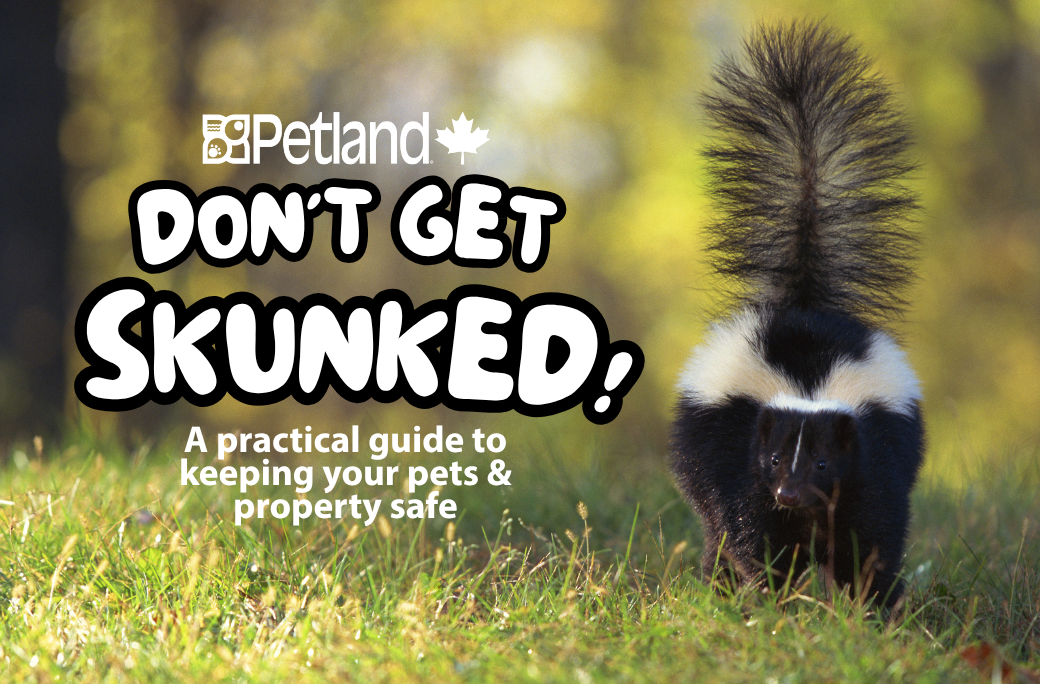Now that summer has arrived, skunks are officially out and about. Here’s how to avoid an unfortunate rendezvous with a skunk, and what to do if you get sprayed, yikes!
Skunk Patrol
Skunks may be smelly, but they are ultimately harmless creatures trying to get along in this world, just like everyone else. Skunks aren't usually aggressive; they spray as a defence mechanism or deterrent, rather than outright aggression. These nocturnal, solitary, and cute animals play a key role in local ecosystems as both predators and prey, and they’re pretty non-confrontational to humans or pets if you respect their space. The bad news is they are rather easily startled if you happen upon them unexpectedly, so watch yourself. Once they spray, it is hard to get the smell out!
How do you keep these smelly creatures out of your yard and away from your family? The best way to keep skunks out of your life is to block access to food sources and possible denning sites. Skunks are opportunists and will forage in your garbage, swipe berries from your bushes, and hunt small prey such as insects or birds. Skunks like easy access to food sources, so feed your pets inside and keep their food secure. Clean up food left outside before dusk, when skunks are most active. Secure garbage bins so that skunks don't find them easy to access. If you suddenly notice that your lawn seems mysteriously torn up with small holes everywhere, it may be from a skunk digging for grubs to eat in the night, so stay frosty.
Next, close off possible denning sites. Skunks love to dwell under houses, porches, sheds, decks, and other small openings. Use chicken wire or fences to keep skunks out of your yard.
What if You Get Skunked?
Skunks are easily spooked, and they don't fool around with their defence mechanism: a diabolical spray of sulphur-based compounds. Furthermore, they are capable of propelling their spray up to 3 meters, and their aim is very accurate. Skunk spray is notoriously hard to remove from skin and fur. So, what do you do if your pet gets skunked?
If your pet gets skunked, bathe them immediately, preferably outside. Find some clothes you don’t care about and wear disposable gloves; the smell of skunk is so potent that it will infiltrate everything it touches, including skin, carpeting, and more. Make a formula of hydrogen peroxide, baking soda, and grease-cutting dish soap. Mix and then sponge onto your pet’s fur, working it well into the undercoat. The hydrogen peroxide is optional, but your mixture will be less effective without it. Leave the mixture to dry before washing it off. Rinse well with water and then bathe your pet normally with soap and water several times. You must act quickly, as the smell can last for months if it's not properly dealt with.
If you aren't comfortable with concocting a DIY skunk shampoo, try Scout's Honour Skunk Odor Eliminator. It’s easy to use and is great for both skunked animals and surfaces.

If the skunk spray got onto clothing, try washing it with Enviro Fresh Laundry Odor Out Unscented Washing Machine Additive. Odor Out Laundry is specifically formulated to eliminate the worst odours using the convenience of your washing machine. Eliminates odours caused by urine, feces, vomit, skunk spray, sports equipment and more. Pet beds, toys, towels, and virtually anything that fits in your machine.

Did your outdoor patio furniture get skunked too? Spray it with an odour remover such as S.O.X. Pet Stain and Odor Remover. You should be able to remove most of the skunk smell if you act quickly and don't let the skunk spray dry for more than a few hours. If the smell lingers, especially inside your house, it's time to call a professional.

Remember: Skunks may be cute, but they can carry rabies and other diseases.
Never try to handle one yourself—call a professional instead.



